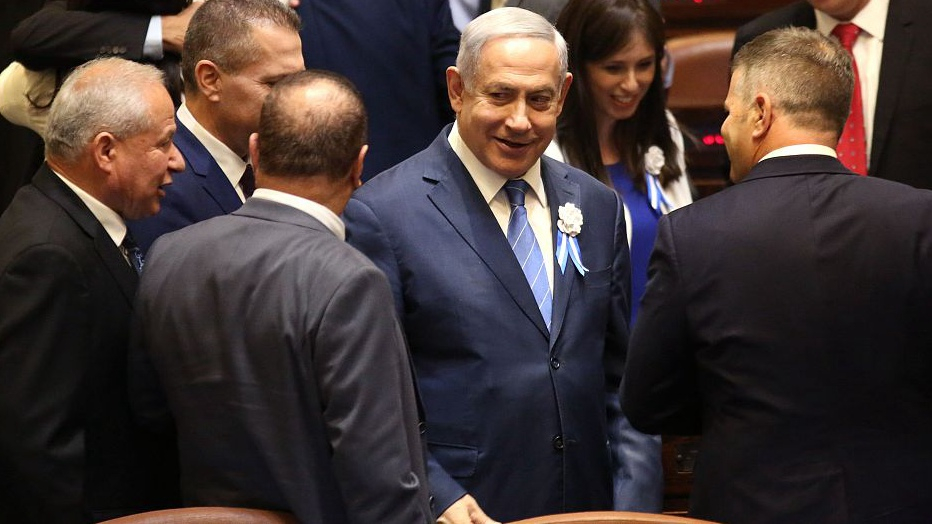
Middle East
17:50, 29-May-2019
Netanyahu's scramble to form a government
By Stephanie Freid

Israel may go to an unprecedented round two of elections if Benjamin Netanyahu is unable to form a coalition by midnight Wednesday. Netanyahu's Likud party and right wing and religious party partners won a general election in April but as the Wednesday midnight deadline to form a new coalition looms, Netanyahu is faltering.
If announced, a new round of elections would likely be called for September.
The 'stumbling blocks'
Netanyahu needs to bring together ultra-orthodox political bodies and ultra-nationalist/secular party Yisrael Beitenu to form a majority coalition.
Yisrael Beitenu is headed by former defense minister Avigdor Lieberman who insists on pushing a military draft bill forward that would oblige ultra-religious Israelis be drafted into the army. Lieberman is pushing the draft bill as a condition for joining a Netanyahu-led coalition. Ultra-Orthodox Jews are, for the most part, allowed to opt out of military duty so if Netanyahu agrees to Lieberman's terms, he will lose the ultra-Orthodox partners he needs to form a coalition.

Israel's Defense Minister Avigdor Lieberman delivers a statement to the media following his party, Yisrael Beitenu, faction meting at the Knesset, Israel's parliament, in Jerusalem November 14, 2018. /Reuters Photo
Israel's Defense Minister Avigdor Lieberman delivers a statement to the media following his party, Yisrael Beitenu, faction meting at the Knesset, Israel's parliament, in Jerusalem November 14, 2018. /Reuters Photo
Lieberman resigned his defense minister post in late 2018 citing irreconcilable differences with Prime Minister Netanyahu over what he referred to as the prime minister's “capitulation” to Hamas operatives in Gaza.
Netanyahu's campaign for immunity
Running parallel to Netanyahu's coalition formation scramble is his reported campaign to secure guarantees from potential coalition partners of their support for a proposed bill to grant sitting prime ministers immunity from criminal charges.
Netanyahu faces impending indictments on bribery, fraud and breach of trust charges – he denies wrongdoing in all cases.
If the prime minister succeeds in forming a new government, legislation to override Israel Supreme Court decisions is also a factor under consideration.
Israelis concerned over the bids for immunity and push to limit Supreme Court judicial powers say the country's democratic nature is at risk.

Israeli Prime Minister Benjamin Netanyahu arrives to chair the weekly cabinet meeting in Jerusalem May 26, 2019. /Reuters Photo
Israeli Prime Minister Benjamin Netanyahu arrives to chair the weekly cabinet meeting in Jerusalem May 26, 2019. /Reuters Photo
Thousands of demonstrators calling for implementing anti-corruption measures in Israel's government took to Tel Aviv's streets the weekend before the coalition formation deadline carrying pro-democracy signs and chanting anti-corruption slogans. Numerous protesters expressed concern over what they say is a growing anti-democratic climate in Israel.
The alternatives: Opposition-led government
With hours left to go before the midnight coalition deadline, the options are:
- An agreement is reached and Netanyahu forms a coalition
- No agreement – the president calls for a new round of elections
- The president turns to a leading opposition party member determined to be capable of forming a government and tasks that party head with putting together a coalition.
A historically unprecedented second election within one year will cost Israeli taxpayers hundreds of millions of shekels.
A preliminary motion to dissolve parliament and move to new elections passed a first draft vote on Monday

SITEMAP
Copyright © 2018 CGTN. Beijing ICP prepared NO.16065310-3
Copyright © 2018 CGTN. Beijing ICP prepared NO.16065310-3